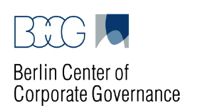Campus
BCCG measures Code climate
 41 percent of German stock corporations see themselves under pressure from the actually voluntary rules of the German Corporate Governance Code (the DCGK). The public, and especially shareholder services and proxy companies, increased the general attitude of expectation, which often rated companies too schematically. These are the findings of a survey by the Berlin Center of Corporate Governance (BCCG) among 487 Board and Supervisory Board Chairmen written to from October 2011 through February, of whom 211 responded.
41 percent of German stock corporations see themselves under pressure from the actually voluntary rules of the German Corporate Governance Code (the DCGK). The public, and especially shareholder services and proxy companies, increased the general attitude of expectation, which often rated companies too schematically. These are the findings of a survey by the Berlin Center of Corporate Governance (BCCG) among 487 Board and Supervisory Board Chairmen written to from October 2011 through February, of whom 211 responded.
The Code, which came into force in 2002, had nonetheless fulfilled its mission to improve corporate governance and improve the reputation of German companies abroad, said 71 percent of the Supervisory Board members and 62 percent of the corporate executives, the report continues. In DAX, MDAX and TecDAX companies the average acceptance had even been higher.
A bone of contention in the study, led by Axel von Werder, was that more criticism of the Code was occurring; the BCCG showed itself a little surprised at the openness of those affected by the regulation. Especially the women's quota, much discussed publicly, earned critical voices. Nearly two-thirds of respondents (63.3 percent) voted for the retention of voluntary schemes, instead of abandoning them by law to, for example, the Federal Ministry of Justice. This approach was suggested by about half of the participants. Around 52 percent also felt the Code requirements were being changed too often. Nearly 88 percent want to keep the current system of recommendations and suggestions.
Spread of Supervisory Board Chiefs’ remuneration widens
 According to calculations by Hostettler, Kramarsch & Partner (HKP), the remuneration of DAX Supervisory Board chairs grew in 2011 by nine percent to an average of €314,000, which is the highest value determined by the consulting firm since 2006. At Allianz, it soared by 63 percent to around €366,800 and at BMW by 45 percent to about €505,000. In contrast, at Lufthansa and RWE the pay dropped by 53 percent to around €175,000, and by 29 percent to just under €250,000.
According to calculations by Hostettler, Kramarsch & Partner (HKP), the remuneration of DAX Supervisory Board chairs grew in 2011 by nine percent to an average of €314,000, which is the highest value determined by the consulting firm since 2006. At Allianz, it soared by 63 percent to around €366,800 and at BMW by 45 percent to about €505,000. In contrast, at Lufthansa and RWE the pay dropped by 53 percent to around €175,000, and by 29 percent to just under €250,000.
As with executive compensation, Volkswagen is also leader for Supervisory Board remuneration: Piëch gets €850,000 annual salary (VW CEO Winterkorn tops the executives at almost 17.5 million euros). Bottom among Supervisory Board chairs is Fritz Jürgen Heckmann of HeidelbergCement with ”only” 130,000 euros.
Overall, the chairmen benefited from higher corporate profits. In contrast to executive pay, which increased by eight percent on average in 2011, the Supervisory Board chiefs did not come under criticism for it. Kramarsch instead presents the opinion that Supervisory Board pay has grown steadily in recent years along with the responsibility of the supervisory body. HKP sees the gap between top and “low” earners as more problematic. It had widened from a factor of five in 2010 to 6.5. Thus, there was pent-up demand in the lower third.















